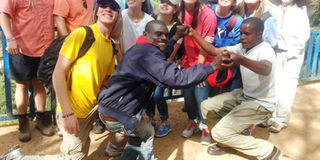From pit latrine to France: The story of Kirokote

Musa Kirokote (in navy blue jacket) pauses for a photo with guests at Thomson Falls in Nyahururu shortly after narrating to them his travel plans. He will be travelling to France to represent the challenges of people like him with autism. He was dumped in a pit latrine at birth. PHOTO/RACHEL KIBUI
What you need to know:
- Kirokote was rescued from a pit latrine in Kisumu, hardly a day after he was born and dumped.
- He suffers from physical as well as mental disability that has seen him endure a difficult life.
- Kirokote, meaning one who was collected, can hardly hide his joy every time he meets a new face.
- He will be flying to France to represent the interests and challenges facing people suffering from acute autism in Kenya.
Musa Kirokote’s story attracts sadness and hope in equal measure.
It starts from his birth when a Good Samaritan rescued him from a pit latrine in Kisumu, hardly a day after he was born and dumped.
Kirokote, 25, suffers from physical as well as mental disability that has seen him endure a difficult life.
But now that has earned him a chance to visit France to represent the interests and challenges facing people suffering from acute autism in Kenya.
Kirokote, meaning one who was collected, can hardly hide his joy every time he meets a new face.
FLYING TO FRANCE
“I will be flying up there in the sky to France to represent people like me who were born and dumped by their mothers” he says to a group of guests in Nyahururu where he lives.
He can hardly complete a sentence without repeating himself.
Saliva flows from his mouth as he tells his story.
But he is quick to say that he will have the blue-checked shirt as it is smart enough for him to wear during the historical safari.
“Ma-a-a-ma ya-a-ngu alinitupa, sasa haju-u-i nita, nita, nitae-e-enda France (Now that my mother dumped me, she will not have a chance to know that I will be leaving for France,” Kirokote tells the guests before unleashing a heavy laughter.
He claps again and again, then walks around shaking hands with the close to 30 guests from US and Kenya who have visited Effatha Home, where Kirokote lives.
Kirokote informs them that he recently acquired a kipande (passport) and is just waiting for an aeroplane to pick him up.
LONG JOURNEY
He then asks the guests if they still remember that he will have a long journey up in the air where he anticipates meeting other white people like his guests.
Kirokote will be representing autistic persons in Trosly, France in September when L’arche International will be marking 50 years of supporting people living with intellectual disabilities.
This organisation supports people with such challenges to live together with similar people and ‘normal’ persons as a community.
At Effatha Home where Kirokote lives, a total of five persons with various levels of autism and several other persons who have no disability at all live.
The home is an affiliate of St Martins Catholic Social Apostolate, an organisation that is currently supporting over 100 persons living with mental challenges.
“Some people just volunteer to come and share part of their lifetime with Kirokote and other persons with mental challenges,” says Francis Kiiru, an assistant workshop attendant at Effatha.
He says integrating with people without disabilities makes autistic people feel appreciated and also sharpens the few skills that they can learn in their lifetime.
AUTISM IN KENYA
Autism Society of Kenya (ASK) estimates that over 800,000 persons live with this condition in the country.
More often than not, autism in Kenya is associated with witchcraft and bad omen, according to ASK.
Kirokote was collected from a pit latrine by a newly wedded woman when he was about a day-old.
The woman took him to a nearby police station but officers on duty asked her to take care of the boy because there were no such facilities at the station.
“She took care of the boy until she died 14 years later,” says Kiiru, before Kirokote adds, “I was collected in a pit but I will be flying to France.”
He was taken by the foster mother’s mother who went with him to Nyahururu where they lived in a slum until Kirokote was adopted by Effatha Home in 2009.
LEARNT SKILLS
At Effatha, Musa has learnt several skills such as light wood work and making candles. He also helps in the kitchen, mostly in cleaning and preparing meals.
This way, he gets an opportunity to live life to his best and kill the boredom he would have suffered at home where he would have been left alone as his granny struggles to earn a living.
Though he can hardly complete a paragraph without getting disrupted by other things, Musa loves singing and dancing.
One of his friends is a local radio DJ whose spinning skills he confesses to admire.
“In France I will sing and dance a lot of reggae like DJ Kago so that people there will know I am so happy,” says Musa before clapping as if to emphasize his statement.
Kiiru says autistic people are very sociable if shown love and understanding by the society.
However, he points out that there is much to be done in order to appreciate them and fight stigma not only in Kenya, but in many parts of the world.





